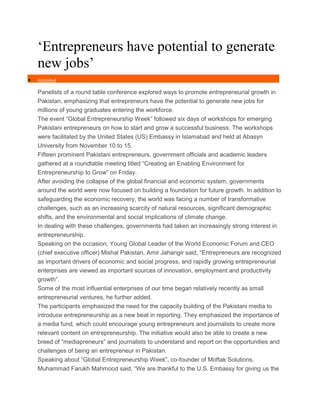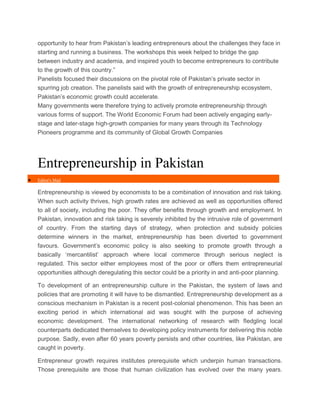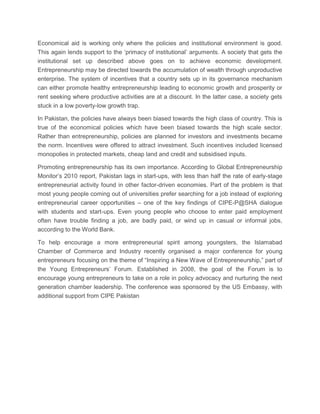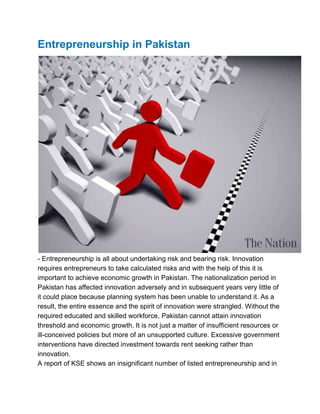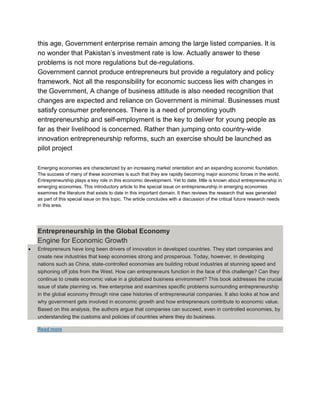Anzala
- 1. âEntrepreneurs have potential to generate new jobsâ ï· Islamabad Panelists of a round table conference explored ways to promote entrepreneurial growth in Pakistan, emphasizing that entrepreneurs have the potential to generate new jobs for millions of young graduates entering the workforce. The event âGlobal Entrepreneurship Weekâ followed six days of workshops for emerging Pakistani entrepreneurs on how to start and grow a successful business. The workshops were facilitated by the United States (US) Embassy in Islamabad and held at Abasyn University from November 10 to 15. Fifteen prominent Pakistani entrepreneurs, government officials and academic leaders gathered at a roundtable meeting titled âCreating an Enabling Environment for Entrepreneurship to Growâ on Friday. After avoiding the collapse of the global financial and economic system, governments around the world were now focused on building a foundation for future growth. In addition to safeguarding the economic recovery, the world was facing a number of transformative challenges, such as an increasing scarcity of natural resources, significant demographic shifts, and the environmental and social implications of climate change. In dealing with these challenges, governments had taken an increasingly strong interest in entrepreneurship. Speaking on the occasion, Young Global Leader of the World Economic Forum and CEO (chief executive officer) Mishal Pakistan, Amir Jahangir said, âEntrepreneurs are recognized as important drivers of economic and social progress, and rapidly growing entrepreneurial enterprises are viewed as important sources of innovation, employment and productivity growthâ. Some of the most influential enterprises of our time began relatively recently as small entrepreneurial ventures, he further added. The participants emphasized the need for the capacity building of the Pakistani media to introduce entrepreneurship as a new beat in reporting. They emphasized the importance of a media fund, which could encourage young entrepreneurs and journalists to create more relevant content on entrepreneurship. The initiative would also be able to create a new breed of âmediapreneursâ and journalists to understand and report on the opportunities and challenges of being an entrepreneur in Pakistan. Speaking about âGlobal Entrepreneurship Weekâ, co-founder of Moftak Solutions, Muhammad Farukh Mahmood said, âWe are thankful to the U.S. Embassy for giving us the
- 2. opportunity to hear from Pakistanâs leading entrepreneurs about the challenges they face in starting and running a business. The workshops this week helped to bridge the gap between industry and academia, and inspired youth to become entrepreneurs to contribute to the growth of this country.â Panelists focused their discussions on the pivotal role of Pakistanâs private sector in spurring job creation. The panelists said with the growth of entrepreneurship ecosystem, Pakistanâs economic growth could accelerate. Many governments were therefore trying to actively promote entrepreneurship through various forms of support. The World Economic Forum had been actively engaging earlystage and later-stage high-growth companies for many years through its Technology Pioneers programme and its community of Global Growth Companies Entrepreneurship in Pakistan ï· Editor's Mail Entrepreneurship is viewed by economists to be a combination of innovation and risk taking. When such activity thrives, high growth rates are achieved as well as opportunities offered to all of society, including the poor. They offer benefits through growth and employment. In Pakistan, innovation and risk taking is severely inhibited by the intrusive role of government of country. From the starting days of strategy, when protection and subsidy policies determine winners in the market, entrepreneurship has been diverted to government favours. Governmentâs economic policy is also seeking to promote growth through a basically âmercantilistâ approach where local commerce through serious neglect is regulated. This sector either employees most of the poor or offers them entrepreneurial opportunities although deregulating this sector could be a priority in and anti-poor planning. To development of an entrepreneurship culture in the Pakistan, the system of laws and policies that are promoting it will have to be dismantled. Entrepreneurship development as a conscious mechanism in Pakistan is a recent post-colonial phenomenon. This has been an exciting period in which international aid was sought with the purpose of achieving economic development. The international networking of research with fledgling local counterparts dedicated themselves to developing policy instruments for delivering this noble purpose. Sadly, even after 60 years poverty persists and other countries, like Pakistan, are caught in poverty. Entrepreneur growth requires institutes prerequisite which underpin human transactions. Those prerequisite are those that human civilization has evolved over the many years.
- 3. Economical aid is working only where the policies and institutional environment is good. This again lends support to the âprimacy of institutionalâ arguments. A society that gets the institutional set up described above goes on to achieve economic development. Entrepreneurship may be directed towards the accumulation of wealth through unproductive enterprise. The system of incentives that a country sets up in its governance mechanism can either promote healthy entrepreneurship leading to economic growth and prosperity or rent seeking where productive activities are at a discount. In the latter case, a society gets stuck in a low poverty-low growth trap. In Pakistan, the policies have always been biased towards the high class of country. This is true of the economical policies which have been biased towards the high scale sector. Rather than entrepreneurship, policies are planned for investors and investments became the norm. Incentives were offered to attract investment. Such incentives included licensed monopolies in protected markets, cheap land and credit and subsidised inputs. Promoting entrepreneurship has its own importance. According to Global Entrepreneurship Monitorâs 2010 report, Pakistan lags in start-ups, with less than half the rate of early-stage entrepreneurial activity found in other factor-driven economies. Part of the problem is that most young people coming out of universities prefer searching for a job instead of exploring entrepreneurial career opportunities â one of the key findings of CIPE-P@SHA dialogue with students and start-ups. Even young people who choose to enter paid employment often have trouble finding a job, are badly paid, or wind up in casual or informal jobs, according to the World Bank. To help encourage a more entrepreneurial spirit among youngsters, the Islamabad Chamber of Commerce and Industry recently organised a major conference for young entrepreneurs focusing on the theme of âInspiring a New Wave of Entrepreneurship,â part of the Young Entrepreneursâ Forum. Established in 2008, the goal of the Forum is to encourage young entrepreneurs to take on a role in policy advocacy and nurturing the next generation chamber leadership. The conference was sponsored by the US Embassy, with additional support from CIPE Pakistan
- 4. Entrepreneurship in Pakistan - Entrepreneurship is all about undertaking risk and bearing risk. Innovation requires entrepreneurs to take calculated risks and with the help of this it is important to achieve economic growth in Pakistan. The nationalization period in Pakistan has affected innovation adversely and in subsequent years very little of it could place because planning system has been unable to understand it. As a result, the entire essence and the spirit of innovation were strangled. Without the required educated and skilled workforce, Pakistan cannot attain innovation threshold and economic growth. It is not just a matter of insufficient resources or ill-conceived policies but more of an unsupported culture. Excessive government interventions have directed investment towards rent seeking rather than innovation. A report of KSE shows an insignificant number of listed entrepreneurship and in
- 5. this age, Government enterprise remain among the large listed companies. It is no wonder that Pakistanâs investment rate is low. Actually answer to these problems is not more regulations but de-regulations. Government cannot produce entrepreneurs but provide a regulatory and policy framework. Not all the responsibility for economic success lies with changes in the Government, A change of business attitude is also needed recognition that changes are expected and reliance on Government is minimal. Businesses must satisfy consumer preferences. There is a need of promoting youth entrepreneurship and self-employment is the key to deliver for young people as far as their livelihood is concerned. Rather than jumping onto country-wide innovation entrepreneurship reforms, such an exercise should be launched as pilot project Emerging economies are characterized by an increasing market orientation and an expanding economic foundation. The success of many of these economies is such that they are rapidly becoming major economic forces in the world. Entrepreneurship plays a key role in this economic development. Yet to date, little is known about entrepreneurship in emerging economies. This introductory article to the special issue on entrepreneurship in emerging economies examines the literature that exists to date in this important domain. It then reviews the research that was generated as part of this special issue on this topic. The article concludes with a discussion of the critical future research needs in this area. Entrepreneurship in the Global Economy Engine for Economic Growth ï· Entrepreneurs have long been drivers of innovation in developed countries. They start companies and create new industries that keep economies strong and prosperous. Today, however, in developing nations such as China, state-controlled economies are building robust industries at stunning speed and siphoning off jobs from the West. How can entrepreneurs function in the face of this challenge? Can they continue to create economic value in a globalized business environment? This book addresses the crucial issue of state planning vs. free enterprise and examines specific problems surrounding entrepreneurship in the global economy through nine case histories of entrepreneurial companies. It also looks at how and why government gets involved in economic growth and how entrepreneurs contribute to economic value. Based on this analysis, the authors argue that companies can succeed, even in controlled economies, by understanding the customs and policies of countries where they do business. Read more

